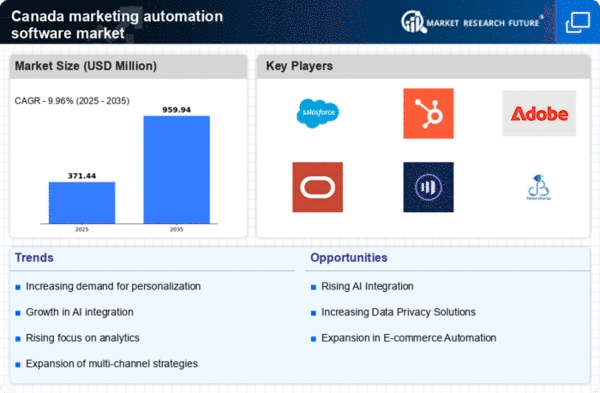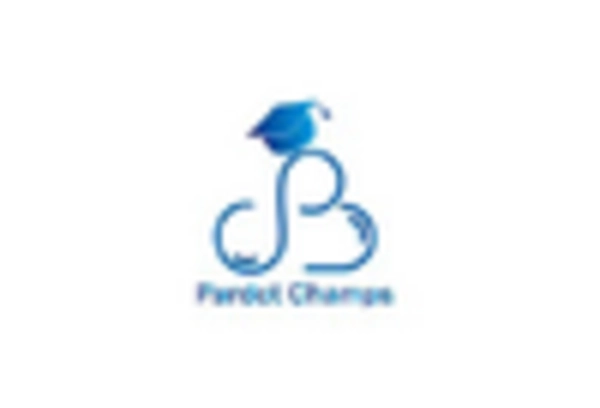Expansion of E-commerce Platforms
The proliferation of e-commerce platforms in Canada significantly influences the marketing automation-software market. With online shopping becoming a primary channel for consumers, businesses are increasingly leveraging automation tools to streamline their marketing efforts. Data indicates that e-commerce sales in Canada reached approximately $40 billion in 2025, highlighting the necessity for effective marketing strategies. Automation software enables companies to manage campaigns across various digital channels, ensuring consistent messaging and improved customer experiences. This trend is likely to drive the adoption of marketing automation solutions, as businesses seek to optimize their online presence and enhance customer engagement.
Rising Demand for Personalization
The marketing automation-software market in Canada experiences a notable surge in demand for personalized marketing strategies. Businesses increasingly recognize that tailored content enhances customer engagement and drives conversion rates. According to recent data, 80% of consumers are more likely to make a purchase when brands offer personalized experiences. This trend compels companies to invest in marketing automation solutions that facilitate data-driven personalization. As a result, the marketing automation-software market is projected to grow significantly, with an estimated CAGR of 12% over the next five years. This growth reflects the industry's adaptation to consumer preferences, emphasizing the importance of delivering relevant content to target audiences.
Growing Importance of Analytics and Reporting
In the marketing automation-software market, the emphasis on analytics and reporting capabilities is becoming increasingly pronounced. Companies in Canada are recognizing the value of data-driven decision-making, which necessitates robust analytics tools. Recent statistics suggest that organizations utilizing marketing automation report a 53% higher conversion rate compared to those that do not. This trend underscores the need for software that not only automates marketing tasks but also provides comprehensive insights into campaign performance. As businesses strive to optimize their marketing strategies, the demand for advanced analytics features within automation software is expected to rise, further propelling market growth.
Emergence of Advanced Integration Capabilities
The marketing automation-software market is evolving with the emergence of advanced integration capabilities that allow seamless connectivity between various marketing tools and platforms. In Canada, businesses are increasingly adopting integrated solutions to streamline their marketing efforts and enhance operational efficiency. Data suggests that organizations utilizing integrated marketing automation systems experience a 30% increase in productivity. This trend indicates a growing recognition of the importance of cohesive marketing strategies that leverage multiple channels. As companies seek to optimize their marketing processes, the demand for sophisticated integration features within automation software is expected to rise, driving market growth.
Increased Focus on Customer Retention Strategies
The marketing automation-software market is witnessing a shift towards customer retention strategies as businesses aim to foster long-term relationships with their clients. In Canada, studies indicate that acquiring a new customer can cost five times more than retaining an existing one. Consequently, companies are investing in automation tools that facilitate targeted communication and loyalty programs. By leveraging marketing automation, businesses can nurture leads and maintain engagement with existing customers, ultimately enhancing customer lifetime value. This focus on retention is likely to drive the growth of the marketing automation-software market, as organizations seek to maximize their return on investment.
















